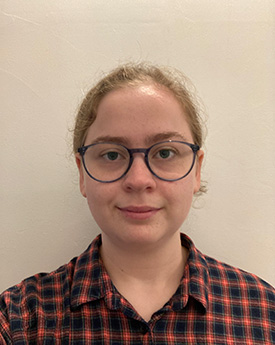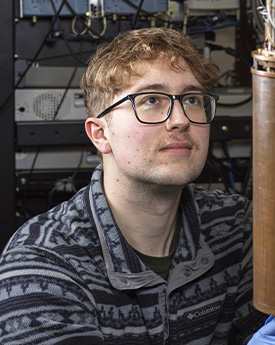Professor Richard Haley
Professor of Low Temperature PhysicsProfile
Rich Haley is an experimental low temperature condensed matter physicist. His research portfolio runs from blue-skies work in superfluid helium-3 at world-record low temperatures through to the technology transfer and knowledge exchange of refrigeration, instrumentation and ultra-sensitive measurement techniques to partners internal and external to Lancaster University, both academic and industrial.
Lancaster Low Temperature Physics exploits bespoke cooling technology to carry out fundamental work on the properties of helium-3, the light isotope of helium, which forms a unique superfluid liquid where friction vanishes and all atoms are in the same quantum-mechanical state. This is the purest and most complex system for which we already have the "Theory of Everything", and has an internal structure that mirrors that of space-time itself. Consequently, as well as being an ideal analogue for almost everything in condensed matter physics, superfluid helium-3 can be used to simulate cosmological phenomena such as black holes.
With a reputation for developing techniques to achieve the lowest possible temperatures, the group is currently leading efforts to cool on-chip nanofabricated systems to the sub-millikelvin regime. Meeting this challenge will open up a new frontier regime for devices such as qubits and quantum-engineeered sensors.
Rich gained his doctorate at the University of Manchester, working on superfluid helium-3, and then worked as a postdoc at the University of Florida performing ultra-low temperature measurements on solid helium. He returned to the UK at the end of 1997 to take up a postdoc in the Lancaster Ultra-Low Temperature group, and in 2002 was awarded a Royal Society University Research Fellowship, extended to 2010. Rich was Head of Low Temperature Physics 2014-18, and led the IsoLab facility build, becoming its Inaugural Director in 2017.
Web Links
Lancaster Ultra Low Temperature Physics
Lancaster Quantum Technology Centre
Current Teaching
PHYS451/452
PhD Supervision Interests
Please contact me if you are interested in a PhD in low temperature physics. We offer a range of projects including: experiments on superfluid helium-3 at world-record low temperatures close to absolute zero; fabricating and cooling nano-electronic and nano-electro-mechanical devices for fundamental science and new quantum technologies; development of new cooling techniques to push the boundaries of the lowest achievable temperatures.
Quantum Enhanced Superfluid Technologies for Dark Matter and Cosmology (QUEST-DMC): PDRA/ECR Extension
01/04/2024 → 31/03/2025
Research
Talent and Research Stabilisation Fund 2022 (Manus Hayne)
21/11/2022 → 31/03/2023
Research
LANCQTFP: Quantum Enhanced Superfluid Technologies for Dark Matter and Cosmology
01/12/2020 → 31/03/2025
Research
H2020 : European Microkelvin Platform (EMP)
01/01/2019 → 31/12/2023
Research
MSI: Driving a mechanical resonator by single electrons
01/03/2018 → 31/08/2020
Research
Development of Cryofree Ultra Low Temperature Environment for Quantum Enhanced Sensors
01/05/2015 → 30/04/2016
Research
Superfluid 3He at UltraLow Temperatures
01/07/2013 → 31/03/2018
Research
Quasiparticle imaging and superfluid flow experiments at ultralow temperatures
01/10/2011 → 30/09/2015
Research
Interdiciplinary workshop on fluctuations and coherence: from superfluids to living systems
01/04/2011 → 31/03/2012
Research
Low Temperature Physics
Low Temperature Physics
Low Temperature Physics
Low Temperature Physics
- FST Sustainability Advisory Committee
- Low Temperature Physics
- Quantum Technology Centre





